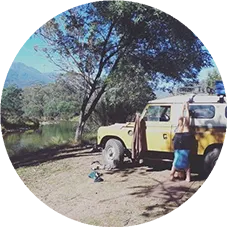
Many years ago now, I lived in a ramshackle community of some thirty to forty itinerants and possibly three times as many dogs, that would greet me happily at the gate with tails wagging as if they were pleased to help me with lugging shopping over a muddy field to where the home fires were burning. It was one of the most welcoming sights, to see the home fires burning. No matter how stressful the day, everything would diffuse around a gallon drum of burning hazel and oak, a smoke and a cider or two and a laugh and a yarn. The trucks and caravans, all installed with woodfires, would be puffing away, their insides warmed against the cold winter.

Ramshackle, chaotic and lovely community life - surrounded by woods and warmed by people
When we moved to Australia, it felt like there was a huge hole inside of me for a long time. I missed communal living, for all it's failings (there was a lot of alcohol, for one, which could make people act in ways you don't really need to deal with in an ordinary and peaceful life - and I don't miss 3 am disco blaring from the end caravan when they'd been out at the pub). I missed the Sunday night dinners, where we would all cook a roast - carrots and peas in one truck, meat in another, gravy and potatoes in another, all brought together in one living space for us to eat together, a miracle of timing and shared purpose. I missed cups of tea in a converted Mercedes bus with the afternoon light on our laps. I missed foraging for wild mushrooms and sharing huge puffballs rolled in egg and breadcrumbs and fried with butter. I missed going wooding with the girls, walking into the forest and lugging limbs up the hill with muddied boots. I missed the water runs, where someone would go to the local church or service station with everyone's 25L water container and fill up the week's supply so when you'd come home, you didn't have to worry about it. I missed sharing. I missed someone always having your back, whether it was because you were short a few quid and needed milk and bread or if you needed a lift into town because your car had broken down, or maybe your generator wasn't working and someone would come to the rescue. It took us years to get used to a life where it was just us, one house, on five acres.

Our beautiful Bedford TK - doing #tinyhomemovement before the #tinyhomemovement
For many years, I have been dreaming of an eco-community that can replace what we lost when we left the UK. Although there were many failings with the ramshackle, chaotic and unsustainable way that our community ran, the potential of it always had me dreaming. Thus, the @ecotrain question of the week, posed by @eco-alex, tempted me. What three things, it asks, do you think are important in an eco-village of tomorrow? You can read the QOTW here.
Community
We live such isolated lives. We seem to have moved away from tribal living, where people support each other in all kinds of ways, to living behind walls and talking through computer screens in the hope of filling that void that longs for people around to help you get through the day to day. Mental health issues are at an all time high, and can be at least in part attributed to loneliness and isolated, though we might have neighbours right over the fence.
In a community, one shares skills and wisdoms. A job shared is a job halved. It is much easier to find creative and practical solutions to life if there are more heads to work on it! I love the idea of having multiple skills in the community so that others can pass on what they know, as well as teaching these skills to children. I watch my nephew run across the road to talk electronic circuits with the ex-electrician across the street, or beg to hang out in Jamie's garage to learn mechanics, or help me make hot cross buns at Easter. There are so many more skills that many people can teach that one or two parents simply can't. Many of these life skills simply cannot be taught at schools, or aren't, as as a teacher myself, I know that most of my real skills come from learning from the people around me. I long for a revolution in the education system, and I think eco-communities can help bring this about.
I must say I had to come back and edit this post to link to @stortebeker's post here as he explains how a community should be diverse - a point I couldn't agree more on! We all bring a diverse range of skills, abilities and qualities that can make a community rich and create something quite magical and strong in the world!

The man teaching the locals a better way to chop wood, Myanmar 2017
'A healthy social life is found only, when in the mirror of each soul the whole community finds its reflection, and when in the whole community the virtue of each one is living' - Rudolph Steiner
The community must, of course, share the same values, but I assume anyone wanting to join an eco-village would know what they are signing up for. Whilst I love the idea of freedom in theory, I would expect some kind of contract that community members would sign up for, considering their adherance to certain values of the eco-village. It's no good building a sustainable, earth conscious village of natural materials and renewable energy if your new family is going to burn tires on the weekend or run a petrol generator all night because their solar isn't connected yet. As much as I loathe the word 'contract', there needs to be some kind of organised 'action plan' should disputes arise, and how best to manage them. In the tiny idyll we lived in, we did have huge disputes, including the night one guy stole our ax and in a drunken rage, took it to his girlfriends truck and hacked the kitchen to matchsticks whilst she stood crying in the rain with babe in arms. It was not pretty, and justice was swift - he was soon evicted. Whilst we would hope that a community founded with members who share the same values would never have to deal with such a thing, you cannot anticipate human behaviour, but what you can anticipate is how to best deal with it in a way that is fair for all.
Land Ownership
In England, we squatted land for the privilege of not paying rent and council tax and all of the other expenses that came along with living in a house, the way the government wants you to. We found disused council land or private land that may have been owned for a long time but the owners had no use for it or hadn't been using it in years. Eventually, the eviction notice would come. There are bailiffs that give you 24 hours to vacate. This means uprooting your vehicle, your children from school, your job, your entire life to shift to another site, which can be incredibly stressful and upsetting, especially when no one was causing harm to the property and it would continue to sit there unused when we had left nothing behind but tire tracks.

How beautiful would it be to live here, with such a view? Why do we settle for claustrophobic housing estates?
The tiny house movement is an answer to home ownership that many young people are looking at in Australia. Less likely to opt in to a mortgage than the generations before, due to the huge demand and costs of housing in an ever growing population, or just an unwillingness to spend years paying off a house with huge amounts of debt. Many councils are looking at options and possibilities for accommodating tiny houses, such as changing the laws for living in a caravan on your property. Yet all of that is still uncertain and unstable, and for those who want to put down permanent roots, impossible, especially if they don't want a home on wheels but to construct an entire eco-village with alternative buildings made of earth and other natural resources.
Land ownership, therefore, is an important part of an eco-village. It needs to be affordable and legally airtight to protect it's community members from eviction. As I thought about this topic, I came across the plans for an eco-village in Australia that has found a way to buy land and begin a community - you can check it out here and there are other communities too that have seem to have found ways around this problem.
Sustainability Through Alternative Garden Creation & Management
Here's the bit that I love the most - the bit that I'm most passionate about. I am lucky enough to have 5 acres of land with some fruit trees and a big vegetable garden, and a gaggle of chooks. I often have more food than I can eat myself and love to share it with the wider community. In my ideal world, people who don't have a garden would come and work in my garden in exchange for produce, but that's the role of community gardens, and in this time poor world, people don't even have the time to tend those, nor the understanding that a garden makes your wallet fatter, your heart fuller and your health better.

If I won Tattslotto (Australia's lottery) and had enough cash to buy land and develop it for an eco-village, I always say that I would make each street centre around a community garden. That way, nature becomes the focus rather than walls and roads and fences. Rather than straight streets and grids, I like the idea of circles where the houses face common land that is worked by the community, either in a roster system or voluntarily based. Those that cannot work the land due to age or injury fulfil other roles here, such as cooking classes or minding children, or working out calenders and records to help it run smoothly. This of course becomes an income source for the community too. I have been listening to podcasts on rewilding where the majority of the land is left to return to nature and the animals are culled to sell at a farm gate. An eco-community to me both restores and stewards the land, as well as cultivates it for value that can be given back to the community that nourishes and nurtures it. There are endless options for how a organic garden (or biodynamic, or permaculture based, or Korean Natural Farming, or any and all of these methods) can feed families as well as be sold to buy needed resources. Workshops would be one - teaching 'outsiders' how to grow mushrooms, for example, or vegetarian cooking classes. Because there is no better feeling than sharing abundance with others.
What three things would you include in an eco-village?
Feel free to join in the conversation - all are invited!


@naturalmedicine II Discord Invite II #naturalmedicine


Discord 🧘About

